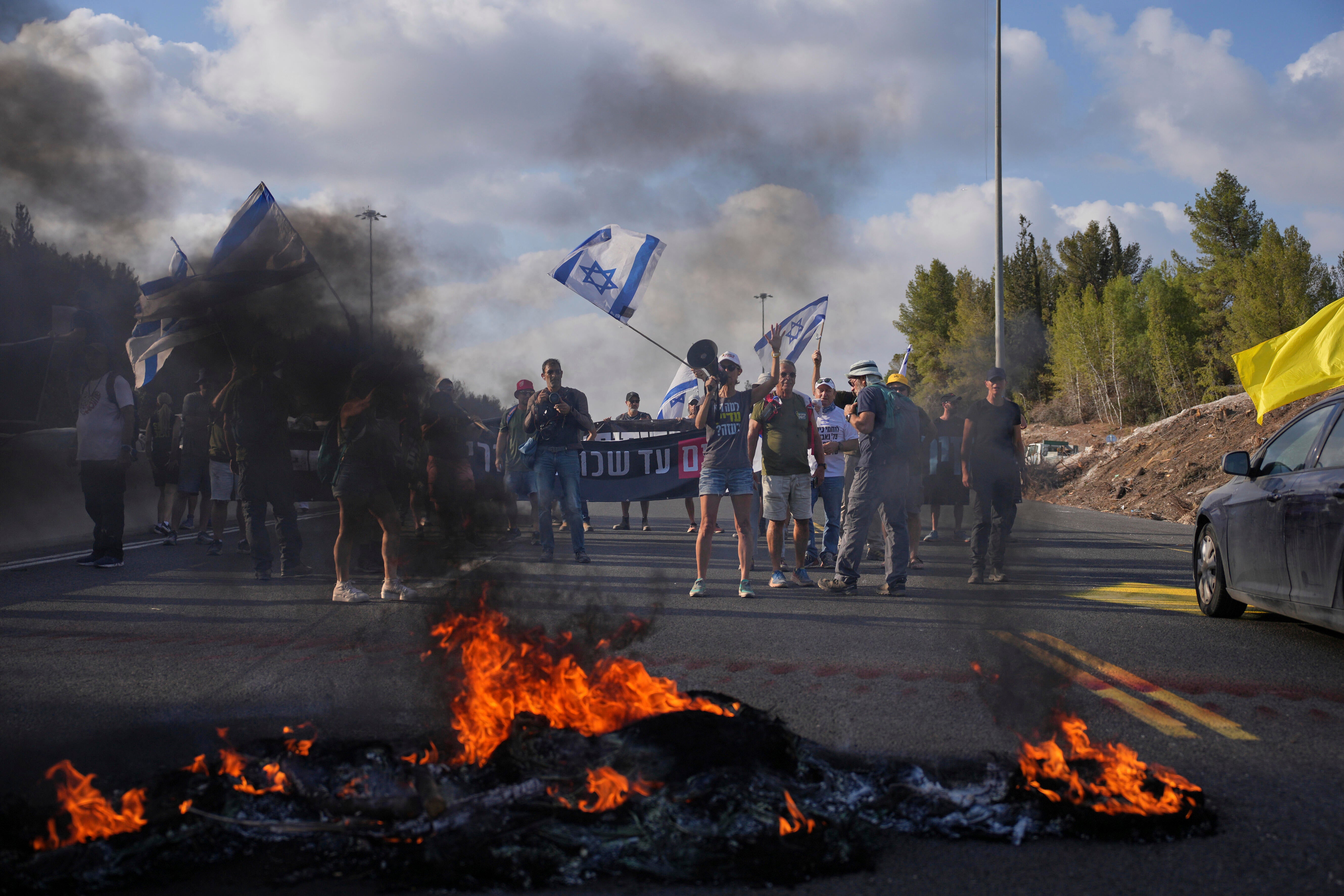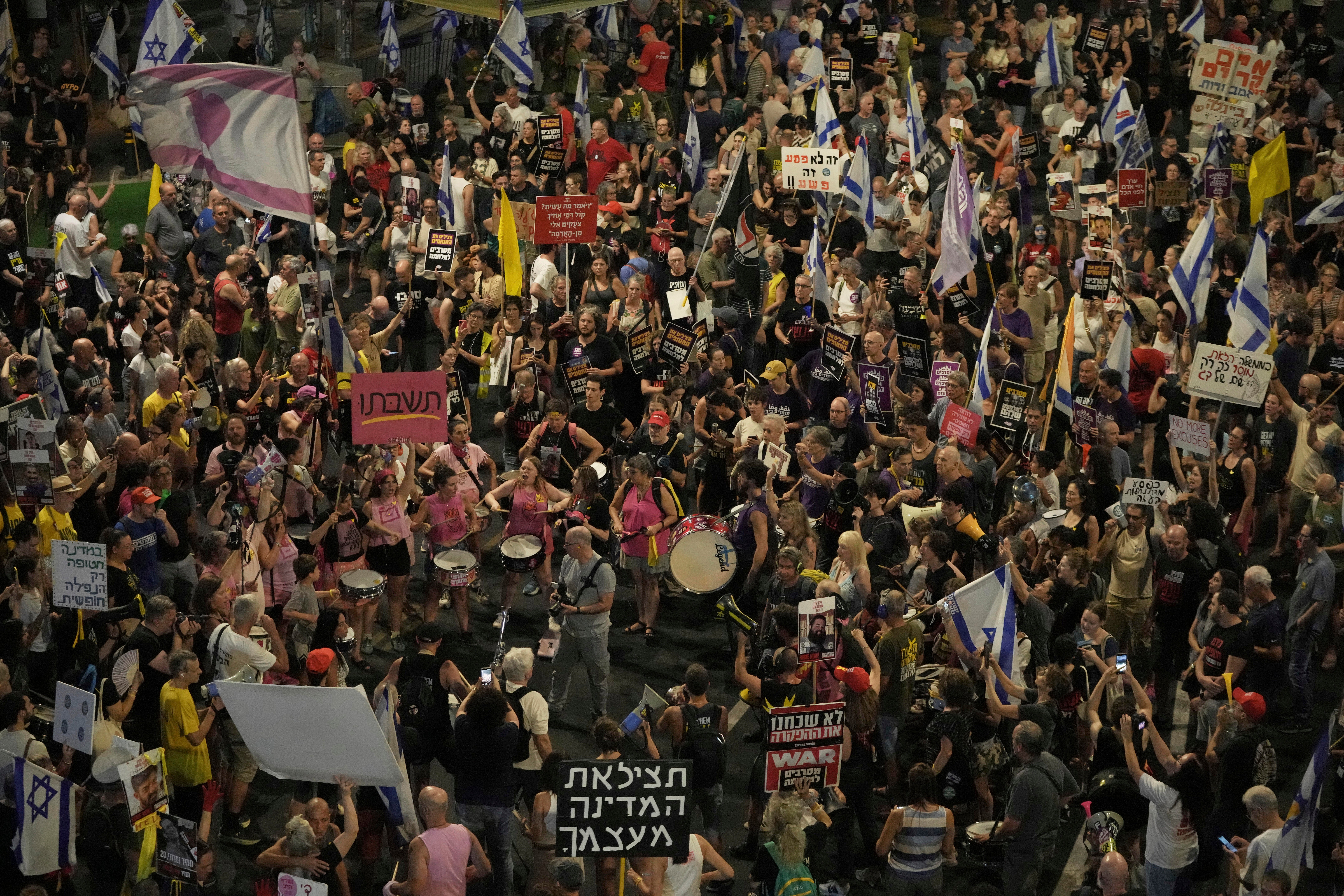Protesters in Israel participated in a nationwide strike on Sunday to demand a deal that would result in a ceasefire with Hamas and the release of hostages who remain in Gaza. The “day of stoppage,” which blocked roads and closed businesses, marked an escalation in the population’s growing frustration after 22 months of war.
Police responding to Sunday’s demonstrations blasted crowds with water cannons and made dozens of arrests. In one instance, officers stopped several protesters from trying to break into the central Ayalon highway in Tel Aviv, leading to a confrontation between them during which a protester was forcibly arrested, CBS News learned. Police also confiscated the protesters’ equipment.
The “day of stoppage” was organized by two groups representing some of the families of hostages and bereaved families, weeks after militant groups released videos of hostages and Israel announced plans for a new military offensive in some of Gaza’s most populated areas.
Ohad Zwigenberg / AP
Protesters, who fear further fighting could endanger the 50 hostages believed to remain in Gaza, only about 20 of whom are thought to be alive, chanted: “We don’t win a war over the bodies of hostages.”
Protesters gathered at dozens of points throughout Israel, including outside politicians’ homes, military headquarters and on major highways, where they were sprayed with water cannons as they blocked lanes and lit bonfires that cloaked roads in smoke. Some restaurants and theaters were closed in solidarity.
Police said they had arrested 32 as part of the nationwide demonstration — one of the fiercest since the uproar over six hostages found dead in Gaza last September.
“Military pressure doesn’t bring hostages back — it only kills them,” former hostage Arbel Yehoud said at a demonstration in Tel Aviv’s hostage square. “The only way to bring them back is through a deal, all at once, without games.”
“Today, we stop everything to save and bring back the hostages and soldiers. Today, we stop everything to remember the supreme value of the sanctity of life,” said Anat Angrest, mother of hostage Matan Angrest. “Today, we stop everything to join hands — right, left, center and everything in between.”
Ohad Zwigenberg / AP
Protesters at highway intersections handed out yellow ribbons, the symbol that represents the hostages, the Hostages and Missing Families Forum, which organized the stoppage, said.
Even though Israel’s largest labor union, Histadrut, ultimately did not join Sunday’s action, strikes of this magnitude are relatively rare in Israel. Many businesses and municipalities decided independently to strike.
Still, an end to the conflict does not appear near. Prime Minister Benjamin Netanyahu has demanded the immediate release of the hostages but is balancing competing pressures, haunted by the potential for mutiny within his coalition.
Israeli leaders criticize demonstrations
Netanyahu addressed the protests on Sunday at a cabinet meeting, saying they were benefiting Hamas.
“Those who are calling today for an end to the war without Hamas’ elimination are not only hardening Hamas’ position and delaying the release of our hostages, they are also ensuring that the horrors of October 7 will repeat themselves and that we will have to fight an endless war,” the prime minister said.
Far-right members of his cabinet insist they won’t support any deal that allows Hamas to retain power. The last time Israel agreed to a ceasefire that released hostages, they threatened to topple Netanyahu’s government.
Finance Minister Bezalel Smotrich on Sunday called the stoppage “a bad and harmful campaign that plays into Hamas’ hands, buries the hostages in the tunnels and attempts to get Israel to surrender to its enemies and jeopardize its security and future.”
National Security Minister Itamar Ben-Gvir, in a statement, accused protesters of trying to “weaken Israel.” Like Smotrich, he said the strike “strengthens Hamas and delays the return of the hostages.”
Mahmoud Illean / AP
Gaza’s Hamas-run health ministry reported that 47 people were killed and at least 226 were wounded across the territory in the last 24 hours alone. Meanwhile, hospitals and eyewitnesses in Gaza reported at least 17 aid-seekers had been killed by Israeli forces on Sunday, including nine awaiting aid trucks close to the Morag corridor. The death toll among Palestinians waiting for food and other aid in Gaza has climbed this summer, sparking outcry around the world as starvation and malnutrition run rampant in the enclave.
Hamza Asfour said he was just north of the corridor, awaiting a convoy, when Israeli snipers fired, first to disperse the crowds, then from tanks hundreds of meters away.
He saw two people with gunshot wounds — one in the chest and other in the shoulder.
“It’s either to take this risk or wait and see my family die of starvation,” he said. “There is no other option.”
The Gaza Humanitarian Foundation, which runs the distribution points, said there was no gunfire Sunday “at or near” its sites, which sit at the end of aid truck routes.
Israel’s military did not immediately respond to questions about strikes in the three areas.
Israel’s air and ground war has already killed tens of thousands of people in Gaza and displaced most of the population. The United Nations is warning that levels of starvation and malnutrition in Gaza are at their highest since the war began.
The Hamas-led attack in 2023 killed around 1,200 people in Israel. Israel’s retaliatory offensive has killed 61,897 people in Gaza, according to the Health Ministry, which does not specify how many were fighters or civilians but says around half were women and children.
2 more children die from malnutrition-related causes
On Sunday, two children died of malnutrition-related causes in Gaza, bringing the death toll from such causes over the last 24 hours to seven, according to Gaza’s health ministry. The total number of deaths related to starvation has risen to 251, including 110 children, said the health ministry, which is part of the Hamas-run government and staffed by medical professionals. The U.N. and independent experts consider it the most reliable source on casualties. Israel disputes its figures but has not provided its own.
While demonstrators in Israel demanded a ceasefire, Israel began preparing for an invasion of Gaza City and other populated parts of the besieged strip, aimed at destroying Hamas.
The military body that coordinates its humanitarian aid to Gaza said Sunday that the supply of tents to the territory would resume. COGAT said it would allow the United Nations to resume importing tents and shelter equipment into Gaza ahead of plans to forcibly evacuate people from combat zones “for their protection.”
The majority of assistance has been blocked from entering Gaza since Israel imposed a total blockade in March after a ceasefire collapsed when Israel restarted its offensive. Deliveries have since partially resumed, though aid organizations say the flow is far below what is needed. Some have accused Israel of “weaponizing aid” through blockades and rules they say turn humanitarian assistance into a tool of its political and military goals.
Israeli airstrikes hit Yemen’s capital on Sunday, escalating strikes on Iran-backed Houthis, who, since the war began, have fired missiles at Israel and targeted ships in the Red Sea.
Both the IDF and a Houthi-run television station in Yemen announced the strikes. Al-Masirah Television said they targeted a power plant in the southern district of Sanhan, sparking a fire and knocking it out of service, the Yemeni station said. Israel’s military said Sunday’s strikes targeted energy infrastructure it claimed was being used by the Houthis, and were launched in response to missiles and drones aimed at Israel.
While some projectiles have breached its missile defenses — notably during its 12-day war with Iran in June — Israel has intercepted the vast majority of missiles launched from Yemen.
U.S. blocks visitor visas from Gaza
The U.S. Department of State on Saturday announced that it would stop issuing visitor visas for people from Gaza.
“All visitor visas for individuals from Gaza are being stopped while we conduct a full and thorough review of the process and procedures used to issue a small number of temporary medical-humanitarian visas in recent days,” the department wrote in a social media post.
Some humanitarian groups have condemned the pause because those visas may be issued to people in need of medical treatment abroad, CBS News partner BBC News reported.
The nonprofit organization Palestine Children’s Relief Fund said in a statement to BBC News that the decision “will have a devastating and irreversible impact on our ability to bring injured and critically ill children from Gaza to the United States for lifesaving medical treatment.”


